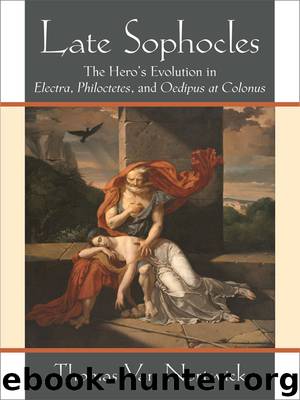Late Sophocles: The Hero’s Evolution in Electra, Philoctetes, and Oedipus at Colonus by Thomas Van Nortwick

Author:Thomas Van Nortwick
Language: eng
Format: epub
Publisher: University of Michigan Press
Published: 2018-05-15T00:00:00+00:00
Another Achilles
After lurking out of sight for eight hundred lines, Odysseus reenters here, just in time to stop Neoptolemus from completely giving in to his better nature. A struggle ensues, with Philoctetes urging his young friend to give him back his bow and Odysseus forbidding it. Philoctetes invokes Lemnos and the ovens of Hephaestus; Odysseus counters with Zeus, “who rules this land” (989). At this point, Philoctetes moves to throw himself off a cliff but two sailors grab him.50 This skirmish makes dramatic sense given Philoctetes’s heroic temperament. Death before slavery is preferable. But the physical restraint also continues the focus on the hero’s body. Where he is and will be makes all the difference.
Though physically restrained, Philoctetes now delivers a long and bitter monologue, which repays our close attention. He opens by again appealing indirectly to Neoptolemus. His hands are tied by order of Odysseus; had he his bow, they would not have been able to sneak up on him, to hunt him down (hupēlthes . . . thērasō, 1007), using as his shield this child, deserving better than Odysseus, a worthy ally for Philoctetes; he knows only how to obey orders; see how he suffers for his part in the deception and for Philoctetes’s suffering! But Odysseus’s evil mind taught this naïve young man how to be clever (sophon, 1015; cf. sophos, 119) in doing evil. Now Odysseus wants to tie Philoctetes up and drag him away from the place where he once abandoned him, friendless, alone, city-less, a dead man among the living. Would that Odysseus were dead! But the gods do nothing for Philoctetes, while Odysseus and the sons of Atreus laugh at him. Yet Odysseus only joined the Trojan expedition after being kidnapped and forced, whereas Philoctetes came of his own free will with seven ships before the generals betrayed him (1004–28). Why are they taking him now? He is nothing, a dead man. Why is he, hated by the gods, not still lame Page 71 → and foul-smelling to the Greeks? How can they set sail with him aboard and make offerings to the gods? Didn’t they throw him away in the first place to please the gods? May they be destroyed miserably! They will indeed die for destroying him, if the gods care for justice. And he knows the gods do care for justice. The Greeks would not have come back for him, a wretched man, if not goaded by the gods (1029–39).
Philoctetes ends by again cursing his enemies: he may be pitiable, but if they are punished, he will have escaped his illness (1040–44). The scale of this tirade puts the question of what to do about Philoctetes squarely before us, to remain there until the end of the play. The prior issues of how Neoptolemus would treat his unwitting captive, and which heroic paradigm would prevail in the molding of the young man’s character, have largely been settled. Achilles and his legacy have been restored at the expense of Odysseus, with all of the concomitant thematic shifts that entails.
Download
This site does not store any files on its server. We only index and link to content provided by other sites. Please contact the content providers to delete copyright contents if any and email us, we'll remove relevant links or contents immediately.
Letters From a Stoic by Seneca(2333)
The Valmiki Ramayana: Vol. 1 by Bibek Debroy(2175)
The Valmiki Ramayana: Vol. 2 by Bibek Debroy(2035)
The Valmiki Ramayana: Vol. 3 by Bibek Debroy(1858)
Mary Boleyn by Alison Weir(1461)
The Greeks by H. D. F. Kitto(1432)
The Notebooks of Leonardo Da Vinci by Da Vinci Leonardo(1250)
Art of Living by Sellars John;(1175)
Mythos (2019 Re-Issue) by Stephen Fry(1170)
The Voynich Manuscript by Gerry Kennedy(1163)
Annals by Tacitus(1158)
Medea and Other Plays by Euripides(1150)
The Classics by Mary Beard(1087)
Claudius the God by Robert Graves(1038)
Kadambari: Bana by Bana(1005)
Appeasement of Radhika by Muddupalani(1001)
Atlantis the Lost Continent Finally Found by Arysio Santos(999)
THE REPUBLIC by plato(992)
Beyond Control by Anthology(979)
